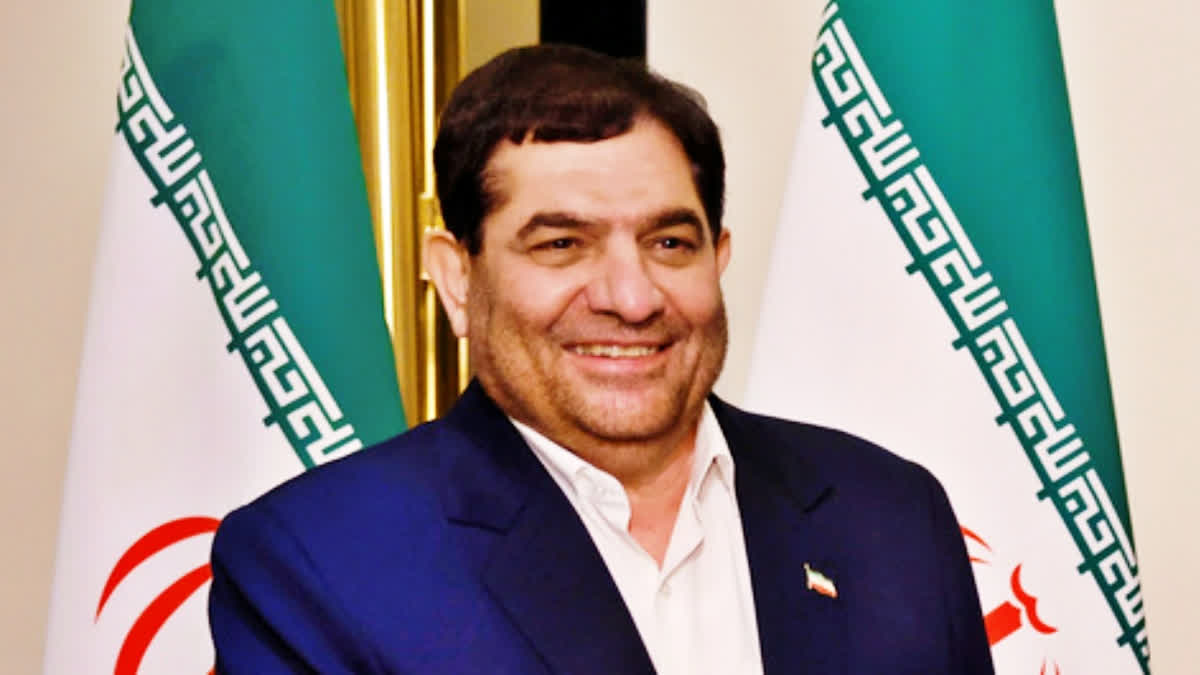New Delhi: In a shocking development, Iranian President Ibrahim Raisi and Foreign Minister Hossein Amir-Abdollahian lost their lives in a helicopter crash in East Azarbaijan on Sunday. According to local media, the helicopter's passengers, including Ebrahim Raisi, Hossein Amir-Abdollahian, Iran's East Azerbaijan Province Governor Malek Rahmati and Ayatollah Mohammad Ali Ale-Hashem, the representative of the Leader of the Islamic Revolution to East Azarbaijan province, along with several other people, were killed in the incident.
With this, what happens in Iran is the biggest question, especially at a time the world is witnessing geopolitical challenges. According to Iranian state news agency, Raisi has been been martyred in the line of service. The death was announced from the podium of the revered mausoleum of Imam Reza, in the President’s hometown of Mashhad, as per local media reports.
First Vice-President Muhammad Mokhber succeeds Ebrahim Raisi as the President
According to Iran's constitution, the duties would typically be assumed by the First Vice-President until a new President is elected. First Vice President Muhammad Mokhber has been appointed as the new acting President. Council consisting of head of the judiciary, Speaker of Parliament and one of the clerics of the Guardian Council will manage the affairs.
There are several appointed Vice-Presidents in Iran, who serve in the Iranian Cabinet. The office of the First Vice-President is considered to be the first among equals. Mohammad Mokhber will serve as the President until an election to the post of President can be held, which must happen within the next 50 days.
Mohammad Mokhber is currently serving as the acting President of Iran, and the 7th Vice-President of Iran. He is also a member of the Expediency Discernment Council. He was former head of the Execution of Imam Khomeini's Order (EIKO), the chairman of board at Sina Bank and deputy governor of Khuzestan Province.
Mokhber has held various high-ranking positions in Iran's government and economy. He has been associated with significant state-owned companies and institutions in Iran, including the Islamic Revolutionary Guard Corps (IRGC) and its affiliated organisations. Mokhber has been involved in economic development projects and has played a role in Iran's industrial and commercial sectors.
Why Raisi's death makes it difficult for Iran?
Under President Ebrahim Raisi, who assumed office in 2021, Iran's domestic and foreign policies have likely shifted. Raisi is considered a hardliner and a staunch conservative, with close ties to the country's Supreme Leader, Ayatollah Ali Khamenei. His presidency suggests a continuation of Iran's conservative agenda, including a focus on bolstering the country's military capabilities and asserting its influence in the region.
It is pertinent to note that under Raisi, Iran has emerged as a major source of the supply of military drones to Russia, which has contributed significantly to Russia’s successful war strategy in Ukraine.
In his three years in power, President Raisi had worked to expand Iran’s influence in the Middle East, which included backing armed groups in several countries in the region, and to accelerate his country’s nuclear programme.
Who is Ebrahim Raisi?
Raisi was born in November 1960 in a religious family in Mashhad.Following the insult to the late founder of the Islamic revolution, Imam Khomeini, in a newspaper on January 7, 1978, and the subsequent rise of popular movements, Raisi joined protest gatherings. While a student he took part in protests against the Western-backed Shah, who was eventually toppled in 1979 in an Islamic Revolution led by Ayatollah Ruhollah Khomeini.
Raisi's career in management began in 1980 when he was appointed as the District Attorney of Karaj, later becoming the city's Attorney. After the revolution he joined the judiciary and served as a prosecutor in several cities while being trained by Ayatollah Khamenei, who became Iran's president in 1981. In 1985, he became the Deputy Prosecutor of Tehran, marking the start of his judicial tenure in Tehran.
From 1989 to 1994, Raisi served as the first Deputy of the Judiciary in Tehran. He was appointed head of the General Inspection Organisation of Iran in 1994, a position he held until 2004. Raisi served as the first deputy of the judiciary from 2004 to 2014, working under two heads of the judiciary. In this capacity, he was responsible for overseeing the organisation and administration of the judiciary. From 2014 to March 2015, he also served as Iran's Attorney General.
In March 2016, Raisi was appointed custodian of Astan Quds Razavi by the Leader of the Islamic Revolution. During his three-year tenure, he implemented significant measures to enhance services at the holy shrine of Imam Reza. After heading Iran's judiciary, Raisi ran unsuccessfully for president in 2017 against Hassan Rouhani, a relatively moderate cleric.
On March 7, 2019, Raisi was appointed head of the judiciary by order of Ayatollah Khamenei. During his tenure, Raisi made significant strides in judicial reforms, addressing economic corruption decisively and enhancing judicial efficiency, earning praise from Ayatollah Khamenei. In the June 2021 presidential election, the 63-year-old former judiciary chief succeeded Hassan Rouhani after a landslide victory. Raisi secured over 18 million votes, becoming the 13th President of Iran.
Read more: Iran Helicopter Crash: President Ebrahim Raisi, Supreme Leader's Protégé, Dies At 63 | Who Was He



